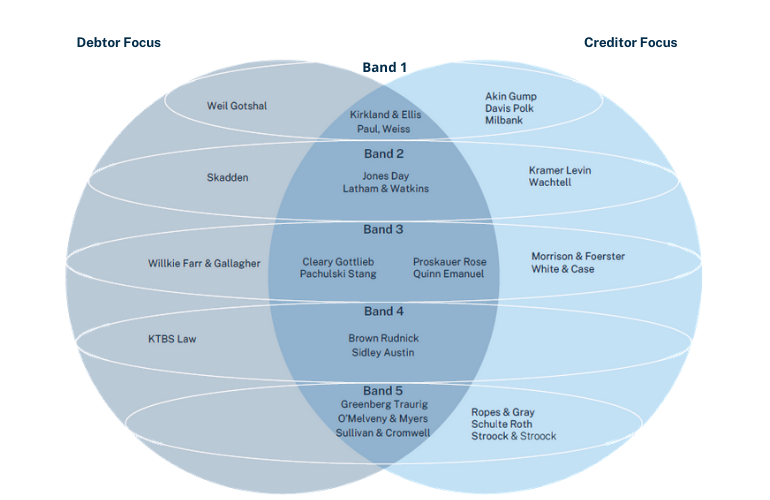USA market snapshot: Bankruptcy / Restructuring
In this Legal Topics article, we provide a market snapshot of the practice areas of Bankruptcy and Restructuring across the United States legal market.

A predicted downturn but in unprecedented circumstances:
Countercyclical practices such as bankruptcy find themselves in a paradoxical situation right now. The heavily predicted upcoming economic downturn fueled in part by the steep decline in oil prices and concerns over the increasingly high levels of corporate debt incurred during the last few years of economic growth in the US had not yet manifested at the start of 2020. Activity in the lateral hiring market pointed to a directed bulking up of bankruptcy teams, ready for the much-anticipated onslaught. Forecasters amended timescales, yet the seemingly inevitable downward spin was still waiting in the wings. Fast forward to April 2020, and the term unprecedented is for once truly applicable. The economic wheel has now turned, but its catalyst and likely impact could not have been predicted a year ago.
COVID-19 is the most severe global pandemic seen in many generations, costing damage to human life and the structures of our previous existence in previously unimaginable ways. The race to prevent further spread of the virus and mitigate the current public health crisis has affected societies across the world, and the current and predicted impact on the economy mirrors this. We are an interconnected world, and so it's unsurprising that one of the first COVID-19 bankruptcies filed in the US was by medical technology company, Valeritas, which had experienced severe supply chain issues caused by the closure of factories in China. Other early indicators of sector-specific distress are as expected: retail, leisure, manufacturing, hospitality and entertainment businesses are joining the ranks of oil and gas producers and airlines in suffering the early economic effects of the virus.
The likely spread of distressed businesses will however be significantly wider. Litigators predict increasing consumer class actions, contract disputes and employment actions that could cause financial hardship for many already facing liquidity concerns. The feared collapse of the CLO market may flood courtrooms in similar form as the RMBS meltdown did over a decade ago, yet the background context now will be one of previously unknown global hardship. Huge numbers of employees have been laid off already, and individual bankruptcy filings will run alongside corporate filings. The significant number of small and mid-sized companies previously flourishing under positive economic conditions will be harder placed to successfully emerge from this period of multilayered distress.
The role of legal counsel in navigating uncharted waters:
Legal counsel play a key role in navigating the waters of any business situation, but such challenging times require expert guidance more than ever, and accordingly, firms are already seeing a significant uptick in inquiries. Businesses are seeking counsel on what government actions such as the amendments to the SBRA mandated by the CARES Act will mean for them, and how to best position themselves to benefit from stimulus plans. Advice on corporate governance in times of turmoil is required, alongside negotiation with lenders and review of insurance policies. When filing a petition is the next step, expert counsel on where to file this as well as the protection afforded by Chapter 11 of the US Bankruptcy Code will be invaluable.
While the laterals market may have slowed temporarily, many firms had already invested in their restructuring bench, and are well positioned to help. Existing giants of the bankruptcy landscape are already sought after by major names from industries across the country. Boutiques with years of dedicated experience are also popular, as are firms with an inbuilt multidisciplinary approach to practicing law. The last year saw a growing number of Chinese companies seeking to declare Chapter 15 Bankruptcy in conjunction with their domestic proceedings under the Enterprise Bankruptcy Law. Firms and practitioners with deep experience in cross-border restructurings are likely to be in particular demand as creditors look to recover all possible losses and debtors seek to consolidate claims under a single plan.
It is still relatively early into the crisis in its current form, yet firms have been quick off the mark when it comes to supporting clients. Many are now offering resource hubs and toolkits designed to address the multifaceted needs of their clients' businesses, as well as webinars, podcasts and cross-practice collaboration. The full impact of COVID-19 is as yet unknown, but its economic and human legacy is likely to endure. Law firms are well-positioned to guide clients through the inevitable financial distress, bringing experience, resources and versatility that will be much needed throughout all layers of the economy.
Other helpful resources:
Our Global Practice Guides provide expert commentary on legal issues from Chambers ranked lawyers around the world. For more information on how bankruptcy laws apply across different countries around the world, including the USA, please visit our Insolvency Global Practice Guide.
To browse related Chambers rankings, you can view our USA Nationwide Rankings, or alternatively, you can select the state or location relevant to you via our Chambers USA 2020 homepage.
All these resources are available for free via Chambers.com.
About Chambers and Partners
Chambers and Partners is the leading independent research company delivering detailed rankings and insight into the world's leading lawyers, employing a team of over 200 researchers who conduct tens of thousands of interviews a year with in-house counsel and third-party experts to delivering detailed insight into providers of legal services. Chambers empowers organizations to make informed decisions when selecting legal services, saving time and resources and reducing risk.
